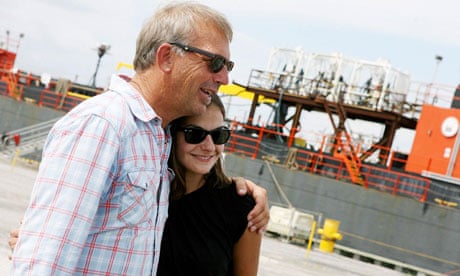When the Hollywood star Kevin Costner unveiled his wonder cleaning device in the middle of the crisis over the Gulf of Mexico oil spill last year he was lauded as a possible saviour. The machine was dubbed the "Costner solution", he was invited to speak before Congress and BP sank more than $50m (£31m) into the idea.
But not everybody has been delighted by the role Costner played as actor-turned-environmental entrepreneur. Fellow screen star and director Stephen Baldwin has launched a multi-million-dollar lawsuit against Costner and his partners in one of the more unusual examples of a Hollywood relationship turning sour.
Baldwin, the younger brother of actors Alec, Daniel and William, claims he was duped into selling his shares in Costner's invention just as BP was agreeing to pour money into it. He is demanding almost $4m in damages, and his fellow claimant, Spyridon Contogouris, more than $10m.
The lawsuit, which was lodged at the new year, has forced a surprising admission from Costner's lawyers. Though Costner acted as the frontman for the centrifugal devices, and presented the case to Congress in June, he has now filed for dismissal of the legal action on the grounds that he played no official role within the company distributing the machines. As the Los Angeles Times put it, Costner had in fact been a "celebrity salesman".
Costner's machine was a byproduct of his 1995 epic flop, Waterworld. The film got him interested in creating technology that could separate oil from water by spinning it, which would be much less polluting than burning oil on the surface or dispersing it with chemicals.
Costner sank 15 years and more than $20m into the project. He told Congress he wanted to develop the technology because he was convinced of its effectiveness, not because "I heard a voice in the cornfield" – a reference to his film The Field of Dreams about a magical baseball park.
He had struggled to generate interest in his creation, but the explosion in the Gulf on 20 April opened up an opportunity. A new company, Ocean Therapy Solutions (OTS), was formed to market the centrifuges to BP, and new investors found. They included Baldwin, who was already looking into making a documentary about the Gulf oil spill. Baldwin took a 10% stake in OTS and his partner Contogouris 28%.
They claim they were deceived into letting go of their portion at precisely the moment that OTS was finalising a deal with BP to sell 32 of the cleaning machines to the oil giant for $52m. Baldwin and Contogouris sold their shares on 11 June last year and discovered a month later that BP had signed the deal on 12 June.
"Mr Costner represented something one way when the facts were different," Baldwin told the Los Angeles Times.
BP's own investment in the centrifuges came to very little. A few machines were put to use in the Gulf shortly before the well was capped, but they never amounted to the "Costner solution" that was billed.
Costner continues to press their cause. Speaking now on behalf of a company called Blue Planet Solutions, he is touting a billion-dollar emergency plan to the US government that would see 190 barges kitted out with oil-separating technology.
The plan has yet to find a backer.
